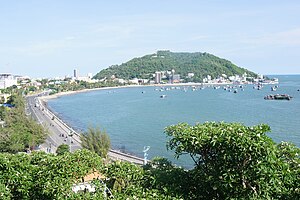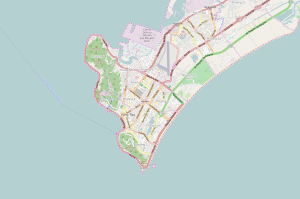Vũng Tàu
| Vũng Tàu | |
|---|---|
| Provincial city | |

Vũng Tàu, as seen from Villa Blanche
|
|
 Map of central Vũng Tàu |
|
| Coordinates: 10°23′N 107°7′E / 10.383°N 107.117°ECoordinates: 10°23′N 107°7′E / 10.383°N 107.117°E | |
| Country |
|
| Province | Bà Rịa–Vũng Tàu Province |
| Area | |
| • Land | 54.5 sq mi (141.1 km2) |
| Population (2016) | |
| • Total | 327,000 |
| • Density | 8,670/sq mi (3,348/km2) |
| • Ethnicities | |
Vũng Tàu (Hanoi accent: [vuŋ˧ˀ˥ taʊ̯˨˩], Saigon accent: [vuŋ˧˩˧ taːw˨˩]) is the largest city and former capital of Bà Rịa–Vũng Tàu Province in Vietnam. The city area is 140 square kilometres (54 square miles), consists of thirteen urban wards and one commune of Long Son Islet. Vũng Tàu was the capital of the province until 2 May 2012, and is the crude oil extraction center of Vietnam.
16 wards: 1, 2, 3, 4, 5, 7, 8, 9, 10, 11, 12, Thắng Nhất, Thắng Nhì, Thắng Tam, Nguyễn An Ninh, Rạch Dừa and 1 commune: Long Sơn.
During 14th and 15th centuries, the cape that would become Vũng Tàu was a swamp which European trading ships visited regularly. The ships' activities inspired the name Vũng Tàu, which means "". The French Indochinese government named it Cap Saint-Jacques ("Cap Xanh Giắc", in Vietnamese). The cliff of Vũng Tàu is now called Mũi Nghinh Phong (literally meaning "Cape of breeze welcome" or "Cape of greeting the wind").
Vũng Tàu was originally referred to as Tam Thắng ("Three Boats") in memory of the first three villages in this area: Thắng Nhất, Thắng Nhị, Thắng Tam, within the province of Biên Hòa under the Nguyễn Dynasty. Under the reign of king Gia Long (1761–1820), when Malay pirates built a base here and subsequently became a danger to traders in Gia Định city, the king sent his army to crack down on the pirates. The pirates were ousted and the troops were given the land as a reward. 10 February 1859 marked the first use of cannons by Nguyễn's army, when they fired at French battleships from the fortress of Phước Thắng, located 100m from Vũng Tàu's Front Beach. This marked an important period in Vietnam's war against French invaders in South Vietnam (then called Cochinchina).
...
Wikipedia
